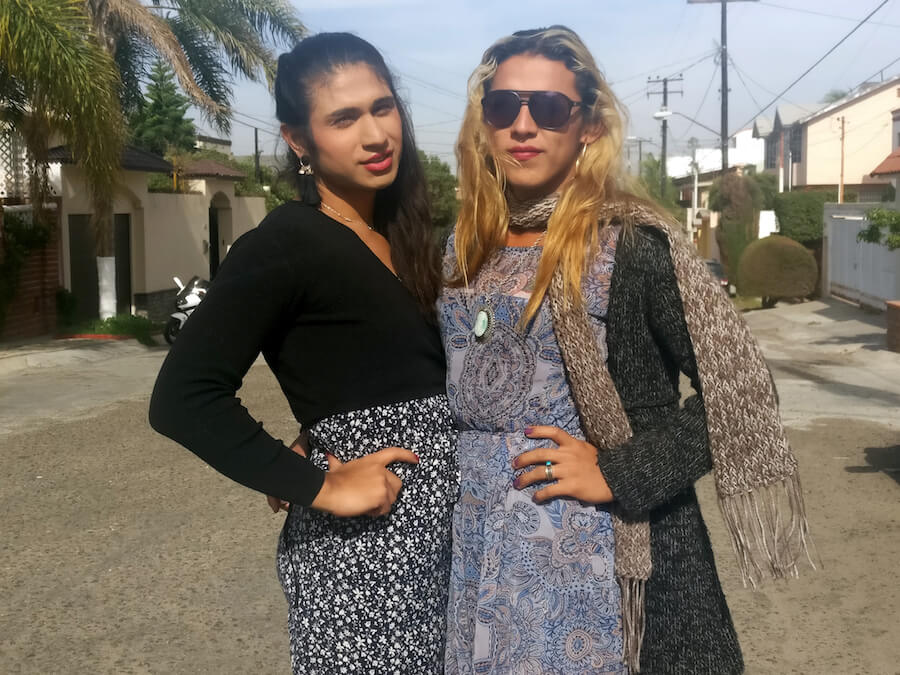César Mejía is a 23-year-old Honduran from San Pedro Sula and one of the leaders of the LGBTQ migrant exodus that just arrived in Tijuana two days ago. Mejía heads a group of 78 people, most of them trans and gay, with a few lesbians and four children — a baby, two toddlers, and a 12-year-old.
Just a few weeks ago, Mejía was watching TV at his home in San Pedro when he saw images of people getting ready to leave the country. He had no job, no safety, and no connection to his family because of being gay. He had nothing to lose, so he joined them on the road.

While traveling through Honduras, he endured daily beatings by gang members. He waited until the group of migrants reached Guatemala to finally take out his rainbow flag and drape it over his backpack.
“Some guys asked me, ‘Where is the flag from?’ And I said, ‘It’s a world flag,’” Mejía tells INTO.
Soon after joining the caravan, Mejía started serving as a leader; becoming the go-to guy for medication, trusted to distribute donations fairly, and talking to organizers and volunteers to secure safe spaces to rest at night.
Some other members of the caravan sold the LGBTQ group their donated water. When in line to get food, the group would be attacked with things like: “Lazy motherfucker! Stop pretending you are a woman.” Trying to shower or use the restrooms, they faced catcalls of a thousand men echoing across the stadiums where they spent the night. The men threatened them with rape.
Ana Kaii was born in Texas to Mexican immigrant parents. Despite growing up in a working-class home, she is now an anthropologist getting her Ph.D. at Harvard. She acknowledges she’s not the average trans woman and combines her research and activism for the advancement of the LGBTQ community. In 2015, she created a collective called Diversidad Sin Fronteras (Diversity Without Borders), utilizing what she learns for research, but also to support the trans community on their transit from Central America and México.

“The cases in the caravan are extreme: body mutilations, constant family abuse, forced migration,” Kaii explains. “Many people don’t understand that for many of them this is just the latest forced exit they are facing. Ever since they are young and come out as trans, they are kicked out of the family unit. Hondurans and Salvadorans move to Guatemala, and don’t move north because of fear.”
“Ever since they are young and come out as trans, they are kicked out of the family unit. Hondurans and Salvadorans move to Guatemala, and don’t move north because of fear.”
Mariela (whose last name is not used for security reasons) is a former sex worker with a gunshot wound in her right leg. Michael Galindo, a 16-year-old from Honduras, is traveling alone because he was sick of beatings so severe he feared they might just kill him.
“We have documented the cases of many trans women who take la bestia (the train) and have been beheaded because of defending themselves against rape or opposing the macho control that governs that train,” Kaii says.
By the time the group got to Mexico City, Kaii and the committee they formed decided to rent some buses for the LGBTQ groups, so they could travel north more safely.
Kaii offered to use donations she gets via Venmo but by then, the story of their travels had gotten some traction. Mejía, Kaii, and others received offers of support — financial, legal, and logistical, helping pay for housing, buses, contacting them with pro bono lawyers and even US sponsors to help build their legal cases — from a dispersed but solid LGBTQ community in Miami, Washington, Arizona, New México, and California. Ana says it is all private donations that sustain their trip.

They traveled by rented buses with human rights personnel at their side and arrived at the beachfront community of Playas de Tijuana. Awaiting them was a swarm of reporters and some very angry neighbors.
Viral videos show women in their 50s aggressively asking the group why they had come. “Don’t you have a house to go to?” said one of them. “How can I know if you are a good person?”
Social networks and local neighborhood group chats exploded, xenophobia and transphobia oozing from the screen. Soon after, a rumor spread that Kaii was an American citizen in charge of a large sex trafficking ring.
Gabriela is a lesbian from Honduras and the mother of a 12-year-old. She declined to give INTO her last name out of fear that her son would be attacked. Both are traveling with the group. When I ask her about the sex-trafficking rumors, she gives me a side look, then a belly laugh, takes a drag of her cigarette and says, “She didn’t pay shit out of pocket and is not into trafficking nothing. People speak, the media speaks … and they can make an ant look like an elephant.”
“People speak, the media speaks … and they can make an ant look like an elephant.”
The same night of their arrival, the angry neighbors featured in the videos went up to the house and apologized to the group. Other people from around the city came to the house offering them warm socks, milk, coffee, eggs, pots and pans. They donated shaving razors, makeup, and toys for the kids.
“Just ask around today,” Kaii says. “Not one incident, not one fight, not one theft. We are very aware of what the Trump rhetoric has done to many Mexicans, who complain about Trump but then have internalized his ideology.”
A little more at ease, the group is now attending legal clinics led by the Santa Ana Dreamers Project, a nonprofit based in Cibola County, New Mexico. Those trainings could come in handy if asylum applicants are detained by ICE and sent to the so-called “trans pod” at Cibola County Correctional Center, where many other trans migrants have been detained after crossing the border.

California-based nonprofit Al Otro Lado (The Other Side) is aiding the group with legal counsel and local knowledge of the particular border dynamic at the port of entry dividing Tijuana from San Diego.
“There is still a great need for more lawyers, especially for gay men who have not been the priority,” Kaii says. She is monitoring the arrival of around 40 more LGBTQ individuals; waiting, watching, anticipating a number of LGBTQ migrants breaking away from the caravans and relying on their own support networks, desperate to find safety and solace at the US border and a new life on US soil.
Help make sure LGBTQ+ stories are being told...
We can't rely on mainstream media to tell our stories. That's why we don't lock our articles behind a paywall. Will you support our mission with a contribution today?
Cancel anytime · Proudly LGBTQ+ owned and operated
Read More in Impact
The Latest on INTO
Subscribe to get a twice-weekly dose of queer news, updates, and insights from the INTO team.
in Your Inbox












